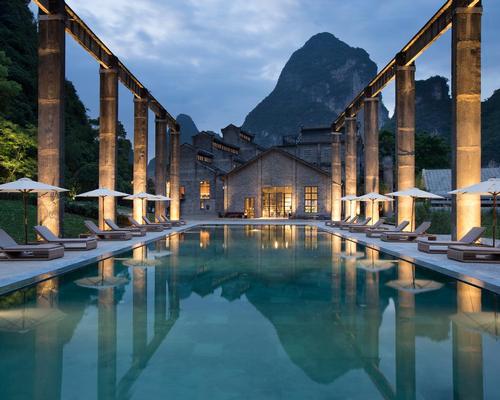You are here:
advice
Learn more >
benefits
Learn more >
stories
Learn more >
reports
Learn more >
presentations
Learn more >
resources
Learn more >
Spa & wellness industry news

Alila Yangshuo, set in historic sugar mill, features underground, ‘cave-like’ spa with walls of volcanic rock
21 Jul 2017 Alila’s second location in China, Alila Yangshuo, is set in a historic sugar mill that has been converted to a 117-bedroom “modern retro” resort in Guilin, overlooking the Li River.A Spa Alila is housed in an underground location that guests access through a modern spiral entry. Walls and floors are made from underground volcanic rocks unearthed during construction, which produced jewelled hues in the cave-like interiors. The spa includes five treatment rooms, and outdoor treatments are also available in the Villa garden.
The spa combines traditions of East and West, with therapists trained in anatomical physiology, massage and meditation. Other wellness facilities include a dramatic outdoor swimming pool, a gym with cardio theatre, weights area, Power Plates and a Kinesis wall.
The Alila Experience provides tailor-made activities across five themes of Cultural Learning, Conscious Living, Active Spirits, Culinary Arts and Surprisingly Different. These include learning organic farming techniques, studying at a local Tai Chi school, rock climbing, river biking, and cooking classes.
Designed by Dong Gong of Vector Architects with interiors by Ju Bin of Horizontal Space Design, the vision of the resort is to integrate the new with the old, and the designers have incorporated elements of the 1960s sugar mill architecture in a bid to bring the story of the historical mill to life. The sugar mill was first opened in the 1920s, and was successful for some years, before economic crisis forced it to become a weapons factory.
Dong Gong uses light and space in relation to the natural surroundings of the building, and has created a modern retro resort while keeping the heritage of the mill intact.
“Alila Yangshuo, as in many of our recent projects, is located in a natural site, so I have the opportunity to think of how the environment can impact and influence the architecture and its function,” said Dong Gong. “I believe that an architect should be in awe of what is called ‘Tian’ in Chinese, or ‘nature’ in Western culture. This means that when you are on site, you see with your heart and invoke the energy of the site environs to define the form and meaning for your architecture.”
The hollow brickwork of the resort was drawn from the sugar blocks that were produced in the 1920s, and Dong Gong designed a machine specifically to produce the custom-made hollow bricks using local sandstone and other material gathered from the construction of the underground Spa Alila. Using more than 60,000 bricks, it took Dong Gong and five tradesmen over six months to hand-make each brick in the construction of the exterior walls of the resort.
“We contemplated how to give the building facade an airy sense of lightness, especially at night, with subtle lighting beaming through the walls,” said Dong Gong. “It’s a building made of concrete, but visually it possesses the quality of lattice work, with light and air.”
Red volcanic rock was also discovered during the construction phase, and was incorporated in the building materials by being ground and mixed into the terrazzo floors and used to create pottery for the guestrooms. Slabs of local clay with etched motifs are used on the bathroom walls, and clay etchings of local tradesmen and peasants in the 1960s are used to decorate the headboards.
The region of Guilin is famous for its limestone hills, tunnels and caves, and Dong Gong’s design concept used caves and passageways built with surprising ups and downs, and some corridors leading to nowhere.
Interior designs incorporate elements of the original sugar mill.
“The Chinese aesthetic concept of ‘beauty is in the old and the turbid’ means that the space must contain a touch of rusticity and must not be too refined,” said interior designer Ju Bin.
After a big opening ceremony 1 July, heavy rainfalls caused the Li River to swell to unprecedented levels and flood area roads, including part of the hotel grounds, delaying the opening until Q1 2018.
Alila's first Chinese property, Alila Anji, opened in 2016. It also plans to open locations in Bintan and Cambodia.
Last year, Alila's parent company, Commune Hotels, merged with Destination Hotels, forming the new Two Roads Hospitality.
More industry news
Further news sources
your weekly careers ezine – sign up here
Enter your email address below to subscribe to our free weekly jobs, news and careers ezine


